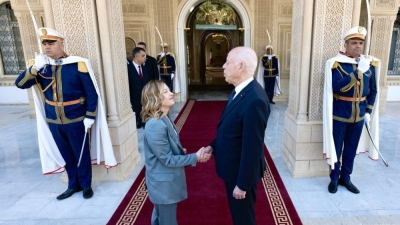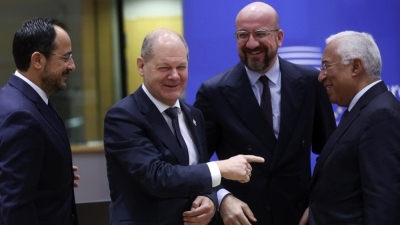Industrial policy: Will the EU have the money to finance its ambitions?

The European Commission put forward ambitious proposals last week to position the EU as a global leader in green industry growth, yet how the industrial development should be financed on a European level remains an open question.
The Commission presented the Net Zero Industry Act and the Critical Raw Materials Act last Thursday (16 March), specifying its goals to establish an industry for climate-friendly technologies in Europe.
These ambitious legislative files have one key objective: recentre the EU as a green industry powerhouse along the entire value chain, from mining to solar manufacturing.
Financing has so far focused on the national level and the short-term – and the Commission relaxed the state aid framework earlier this month and simplified companies’ access to public money within the limits of existing budgets to support green tech investments.
However, extending national subsidies through relaxed state aid rules bears considerable risks, as it disproportionally benefits larger member states with more financial firepower and could lead to a subsidy ‘race to the bottom’ within the EU.
“We’re going very fast on loosening the aid rules”, but we’re lagging on long-term financing, warned Shahin Vallée, a senior research fellow at the German Council on Foreign Relations (DGAP).
While the new state aid framework is only temporary, it could have “permanent consequences for the EU” and lead to fragmentation if a more sustainable option isn’t found quickly, he told EURACTIV.

EU state aid: The good and the bad of opening the floodgates
The EU’s Temporary Crisis and Transition Framework (TCTF), which allows member states to subsidise sustainable technologies, is welcomed by advocates for green industrial policy – but some NGOs fear it will be counterproductive for the environment and SMEs.
European Sovereignty Fund: Looking at existing cash
Enter the European Sovereignty Fund. The negotiations will start in the summer while the review of the EU’s 2021-27 budget is underway.
The Commission announced the Fund in early February to pool EU finances that could be equitably distributed to finance strategic projects in all member states.
“The Fund is essentially a recalibrating tool to offset the worst impacts of state aid on internal market stability”, Michel Petite, a lawyer and former Commission legal affairs chief, told EURACTIV.
Officials and political leaders suggest that Fund money could come from existing pots of cash that stem from the EU’s Next Generation EU (NGEU) fund, an €800-billion joint debt instrument formed to support the economic recovery after the pandemic.
Thierry Breton confirmed earlier in March that he wanted to “mobilise all NGEU funds” through a budget review before looking for fresh money.
The EU budget is due to be revised in July to reroute budget lines in light of the war in Ukraine, inflationary pressures and the introduction of the Green Deal Industrial Plan to curb the effects of the US Inflation Reduction Act (IRA) on EU industry.
This take is shared by Commission officials, who confirmed that rerouting existing budget lines as part of the review would be a reliable source of cash member states would be able to tap into.

EU response to Inflation Reduction Act must not damage competitive markets
Europe’s green subsidy splurge risks increasing market concentration through capture by large corporations. The EU must seek to ensure that its relaxed state aid framework benefit a wide set of companies, not just big business, argues Max von Thun.
Max von …
Own resources
Another financing option includes increasing the EU’s own resources. There are already several proposals on the table to increase them – most notably through the EU Emissions Trading System, the carbon border adjustment mechanism (CBAM), or the new OECD tax that targets profits from multinational companies.
Once these schemes are up and running at full speed, in the years 2026-2030, these new sources of revenue are expected to generate, on average, a total of up to €17 billion annually for the EU budget, according to Commission estimates.
However, these €17 billion are dedicated to repaying the NGEU debt interests, not funding new projects. It is also less than clear whether these additional streams of income will be implemented, as negotiations regarding the OECD tax, for instance, are currently stalling.
“We were already supposed to come up with new own resources in the course of NextGenEU in 2020, but we didn’t manage to do so far,” said Vallée.
“I don’t think there have been a lot of ambitious proposals for new own resources. I’m hoping this comes, but this hasn’t been the case yet,” he added.

Subscribe to The Economy Brief
Subscribe to EURACTIV’s Economy Brief, where you’ll find the latest roundup of news about the European economy and about a variety of policy issues from workers’ rights over trade agreements to financial regulation.
Brought to you by János Allenbach-Ammann (@JanosAllAmm). …
Joint borrowing off the table
On the other hand, joint borrowing is no longer a priority.
Commissioner Breton said earlier this month in Paris that “we are in a context of urgency, and it will be easier to find a political agreement as part of the revision of the [EU budget] than through joint borrowing”.
Elvire Fabry, Senior Research Fellow at the Jacques Delors Institute in Paris, also told EURACTIV that putting joint borrowing at the centre of the debate was a red herring, a way to draw clear-cut divergences – but not conducive to any sound debates among member states.
However, Petite is not sure that joint borrowing will be completely off the table. “The Commission has taken on a new role ever since the COVID-19 pandemic” as the EU’s prime financier, benefiting from its AAA rating, he argued.
“Each crisis has brought with it a new set of prerogatives for the Commission”, and so it is likely to look at joint debt favourably, Petite said.

EU’s Breton: Joint debt for green transition no longer a priority
Joint borrowing is currently not an option to help member states finance the green transition, Internal Market Commissioner Thierry Breton said on Monday (13 March), marking a shift from previous calls for ‘mutualised tools’ at the European level.



